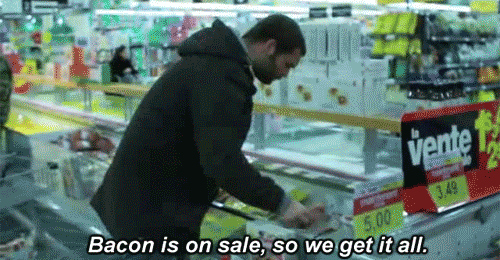Black Friday comes around every year and without fail some of us inevitably end up salivating over the sales, but that doesn't mean we need to throw all our savings at the latest 4K TV or smart home gadget. Here are some top tips to stop the shops emptying your wallet:
1
Choose the right time
https://giphy.com/gifs/shopping-vapcLn7ln7Oi4
It’s a bad idea to go shopping after a hard day at work, when you’re on a deadline to be somewhere else, or at any time when your ability to exercise willpower or make rational decisions is impaired.
But don’t some people thrive under pressure? “No,” says Dr Dimitrios Tsivrikos, a consumer psychologist at University College London. “When we are put under pressure, we are reducing the time needed to complete a task, but not increasing the effectiveness of making the right decision.”
2
Don’t be controlled
Retailers have many sophisticated strategies for getting into our wallets. They know that sounds, scents, colours and signage, among other things, can manipulate consumer behaviour. In retail, the engineering of all or some of these elements to create an enticing shopping environment is called ‘atmospherics’ and it is grounded in solid science.
In a 2012 study, for example, Swedish researchers played background music in an electronics store and then surveyed shoppers on their way out. They found that, overall, shoppers stayed longer and spent more money when music was playing. But it’s not entirely straightforward – when there was no music, women enjoyed themselves more and spent more than men.
3
Don’t be a hoarder
According to Tsivrikos: “Humans are competitive animals. We’re fighting for resources. Big crowds create a competitive environment where people buy, buy, buy. They need to make sure they don’t miss out on something, rather than really evaluating rationally what they might need.” He says that this is why Primark is successful – people walk over each other to prevent someone stealing ‘their’ T-shirt.
4
Pore over packaging
https://giphy.com/gifs/troop-beverly-hills-shelley-long-phyllis-nefler-f296tuFDSwAE0
Packaging is designed to be eye-catching and appealing, rather than to tell us everything we need to know. Eye-tracking research published in January 2015 reveals where we look first on a packet of biscuits or chocolate. Our eyes move from the biggest to the smallest design elements and from left to right. Weight or nutritional information positioned on the right might be the last thing you study.
5
Leave the real world
https://giphy.com/gifs/steam-sale-computer-money-5NGfijqwsN7ry
Shop online to avoid all the temptations of the high street. “When you enter a store, there is a natural deadline for when you need to make a decision,” Tsivrikos explains. “That sense of urgency is not present online, because we’re so used to using the internet as a browsing platform that we don’t feel the pressure to purchase on the spot. It allows consumers to make a more carefully selected choice.”
6
Read the reviews
We think that online reviews will help us make the right decisions. Around half of us use online reviews when buying services, like holidays. But don’t be fooled by fakes – companies can hire people to write glowing reviews. In 2013, researchers at Harvard and Boston estimated that 20 per cent of reviews on the website Yelp were fake. So make sure you read 1- and 2-star reviews as well as the 5-star ones.
7
Pound the streets
There’s always the chance that you might find a better deal in a different store. But there’s another reason to shop around – to teach yourself how to shop. “We’re educating ourselves,” says Tsivrikos. “When we expose ourselves to different retailers, stores and websites, we’re training ourselves to be better consumers and to be more observant. We learn retailers’ tricks and how to avoid them.”
8
Don’t shop in a group
https://giphy.com/gifs/minions-shopping-Ejn6xH5mnmtMI
There’s some evidence to suggest that people make more impulse buys when shopping in a group. It’s not certain whether this is true only of ‘collectivistic’ cultures that emphasise the needs of groups over individuals – as in some Asian countries. But we’ve all felt disappointment after being the only one to come home empty-handed from a shopping trip. Just don’t beat yourself up about it.
9
Do your maths
Discounts are designed to befuddle us. Imagine you’re trying to choose between two bottles of hand lotion. One comes with an extra, half-size bottle and is described as 50 per cent extra free, while the other has 33 per cent off. Which is the better deal? Actually, they’re both the same. But a 2012 study published in the Journal Of Marketing found that when presented with the same dilemma, nearly three quarters of people went for the free bottle.
“The last thing we want to do is start calculating percentage discounts,” says Tsivrikos. “The more trust we put in our own instinct, and our own level of calculation, the less likely we are to actually make the right decision.” So get a calculator app or check with a shopping buddy – just don’t rely on your gut feeling or your mathematics skills.
10
Don’t even bother
https://giphy.com/gifs/interesting-shopping-cart-Np9qNPPc0QrTy
Finally, if you’re the sort of person that just can’t help themselves when it comes to shopping, perhaps you would be better off staying away when the sales are on. An Australian study published in 2014 found that compulsive shoppers felt the need to buy far more urgently when non-essential items were presented as being on sale. While the shoppers in a control group did find sale items more enticing than non-sale items, various discounts and claims about items being the ‘last in store’ had a greater effect on compulsive shoppers.
The researchers reckoned that the compulsive shoppers were motivated by a fear of missing out and a belief that buying the item from the shop would make them feel better.
Follow Science Focus on Twitter, Facebook, Instagram and Flipboard
